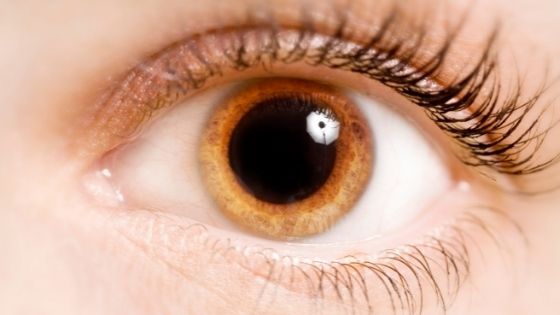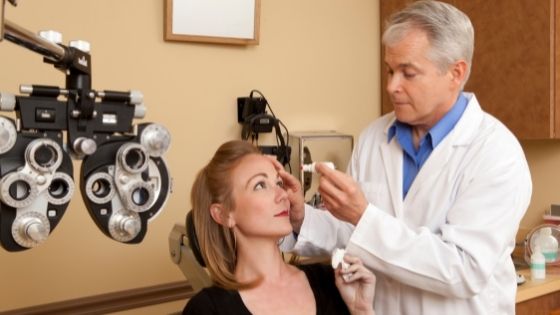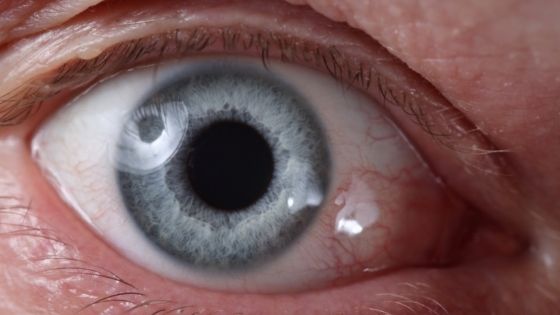Why is it necessary to get your eyes dilated?

Why do you need to get your eyes dilated? You might think that getting your eyes dilated is a simple, quick procedure. But there’s actually more to it than meets the eye (pun intended).
There are many reasons why you should consider getting your eyes dilated, and some of them may surprise you. So if you want to learn about all the benefits of having your eyes dilated, keep reading!
- What is eye dilation?
- What conditions require you to get your eyes dilated?
- Why do eye doctors dilate your eyes?
- When should I get my eyes dilated?
- How often do I need a comprehensive dilated eye exam?
- When should I avoid getting my eyes dilated?
- Side effects of dilation
- When do you have dilated eyes without a comprehensive dilated eye exam?
- Conclusion
What is eye dilation?
Eye dilation is a medical procedure in which the pupils of your eyes are enlarged with eye drops so that a doctor can view the interior structures of your eyes for assessment and treatment.
It is important to note that eye dilation should not be confused with eye exams where you just read letters on a chart. However, dilating your eyes for an eye exam is a necessary precaution to protect your eyes.
What conditions require you to get your eyes dilated?

Some ophthalmological procedures require you to undergo eye dilation, including cataract surgery, strabismus surgery, and keratoconus surgery.
People who have diabetes or glaucoma will sometimes need to get their eyes dilated to diagnose their conditions because the symptoms of these diseases are often hidden behind contracted pupils.
Why do eye doctors dilate your eyes?
The main reason doctors dilate your eyes is that it allows them to get a better view of the interior structures of your eye.
When you are standing in front of an eye doctor, they will want to have a good look at:
- Your retina (the light-sensitive lining at the back of your eye)
- Your optic nerve (the nerve that sends signals from your retina to your brain)
- Finally, your eye fluid, which is called the aqueous humor.
However, these structures are completely invisible unless you get your eyes dilated.
The second reason eye doctors may ask you to have your eyes dilated is that it allows them to see more of what is going on in front of your retina.
This is helpful for people with high blood pressure, diabetes, and glaucoma.
So the next time you see an eye doctor, make sure that you tell them if you have already had your eyes dilated recently, as it may affect their assessment.
When should I get my eyes dilated?
There are two times when you should get your eyes dilated, and that is before a cataract procedure and before a strabismus surgery (eye muscle surgery).
Cataract eye surgery requires removing the natural lens inside your eye to make room for an artificial lens implant.
This procedure requires pupil dilation because the lens inside your eye blocks light from entering your retina. Therefore, they have to dilate the pupil to allow light to pass through.
Before undergoing strabismus surgery (also known as eye muscle surgery), you need to be dilated because it requires visual information from both of your eyes so that the doctor can carefully align your eyes before the surgery. In addition, this allows the doctor to remove any muscle that may be inhibiting clear vision.
If you are planning to undergo a strabismus or cataract procedure, make sure that you tell your eye doctor when your last eye dilation was and if it has been less than 6 months since then.
How often do I need a comprehensive dilated eye exam?
If you have diabetes or glaucoma, you should try to get your eyes dilated once every year.
People who have diabetes will need to get their eyes dilated more often than people without diabetes because it is important to accurately assess the blood vessel growth to identify and treat an early stage of diabetic retinopathy.
If you have glaucoma, then getting your eyes dilated is the only way to detect this condition.
When should I avoid getting my eyes dilated?
The answer lies in what the purpose of your visit to the eye doctor was in the first place.
If you were going for a routine eye exam and the doctor asked you to get your eyes dilated, tell them that you have already recently had your eyes dilated.
However! If you were planning on having a procedure done at the eye clinic (like cataract surgery) and the doctor asked for your eyes to be dilated, you must get your eyes dilated before the procedure.
If you do not have your eyes dilated and go through with the cataract surgery, then there is a possibility that your retina could detach from your eye during the process because it was never able to focus light onto it correctly.
For this same reason, you might also be asked to get your eyes dilated if you have a corneal transplant.
So, while not getting your eyes dilated before a procedure might seem like a good idea (because it saves you the discomfort), I would strongly advise against it as this is crucial in preventing major complications from occurring.
The National Eye Institute recommends all children receive a comprehensive dilated eye examination every year if they are experiencing any symptoms of visual impairment or have not had a comprehensive eye exam within the past two years.
Side effects of dilation

When you get your eyes dilated, they will most likely be sensitive to light for at least 3-4 hours after the eye drop has worn off.
Sensitivity to sunlight
If you are attending an event or going out somewhere, that requires a lot of sunlight exposure. Then bring sunglasses with you so that your eyes can adjust easily without having to squint all the time.
Blurry vision
Blurry vision is also widespread after your eyes are dilated. If you experience any of these symptoms, remember that they will wear off eventually, and there is really no need for you to worry about them!
As always, if the discomfort persists or becomes unbearable, then go ahead and schedule an appointment with your local eye doctor!
Light sensitivity
If you are going to be using your phone or watching TV, then make sure that all of the lights in your house are turned off so that it is as dark as possible. You can also wear sunglasses if they help you feel more comfortable. But avoid driving while wearing them since this will reduce your field of vision and makes it harder for you to see objects.
If you are doing anything that requires more light (like reading, writing, or driving), don't do it while your eyes still feel sensitive. The lights will be too bright and might cause headaches or even more discomfort than normal.
The pupil enlarges about 8-10mm in diameter after being exposed to eye drops. This can take a good 10-15 minutes to settle down, so you might not be able to drive or go home right away.
When do you have dilated eyes without a comprehensive dilated eye exam?
Medicines
Drugs, long periods of darkness (such as closing your eyes for several hours), or staring at a bright light can cause your pupils to become dilated. However, sometimes people think that this is a sign of something severe.
Recreational drug use
Drug use changes the way the mind and body appear to work – it can dilate pupils. In these cases, dilated pupils are a side effect of the medicine and do not indicate a more serious condition.
Congenital aniridia
Congenital aniridia is a condition that causes the pupil not to develop properly. People with this condition often have eyes that appear to be dilated at all times. However, this is due to the lack of iris and not drug use or another serious illness.
Eye diseases or injury
In cases where an eye injury has taken place, the eye will appear dilated. With this diagnosis, you will likely have blurred vision, blood in the whites of your eyes (sclera), and/or pain.
Age-related macular degeneration
Age-related macular degeneration is a condition caused by damage to the retina. The retina helps you see things when there's not enough light. It contains photoreceptor cells that are responsible for producing the vision you see when light is present.
Adie's pupil
Adie's pupil is another condition that has the appearance of dilated pupils. This is due to instability in the sympathetic nerve supply to the eye and is unrelated to drug use or a serious illness.
Conclusion
Getting your eyes dilated can be a lifesaver! If you know that you need to see better, but don't want to deal with glasses or contact lenses, then this is the perfect solution. It's so much easier than going in for an exam and getting fitted for prescription lenses. I love my new lens-free life after having my pupils widened at home. You should try it too! (Trusted sources 1*, 2*, 3*)
Medically reviewed and approved by Nataniel Josue M D.
